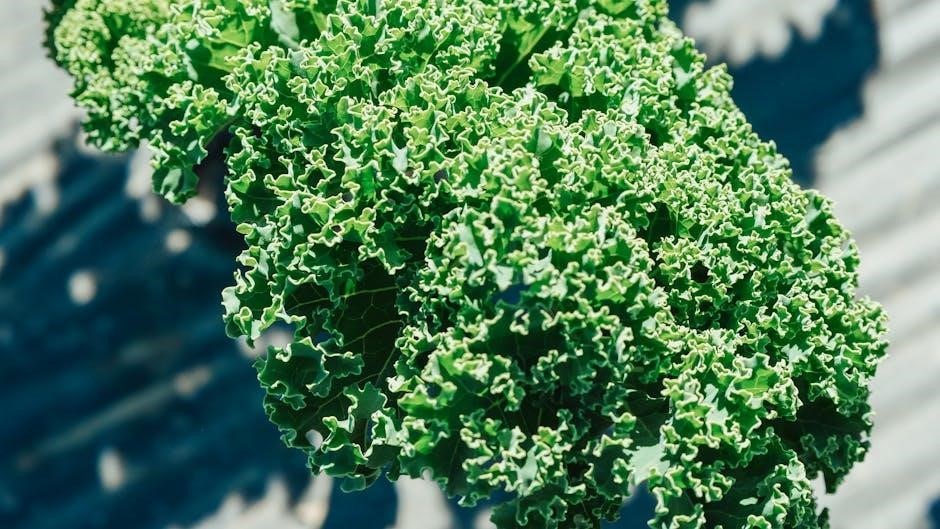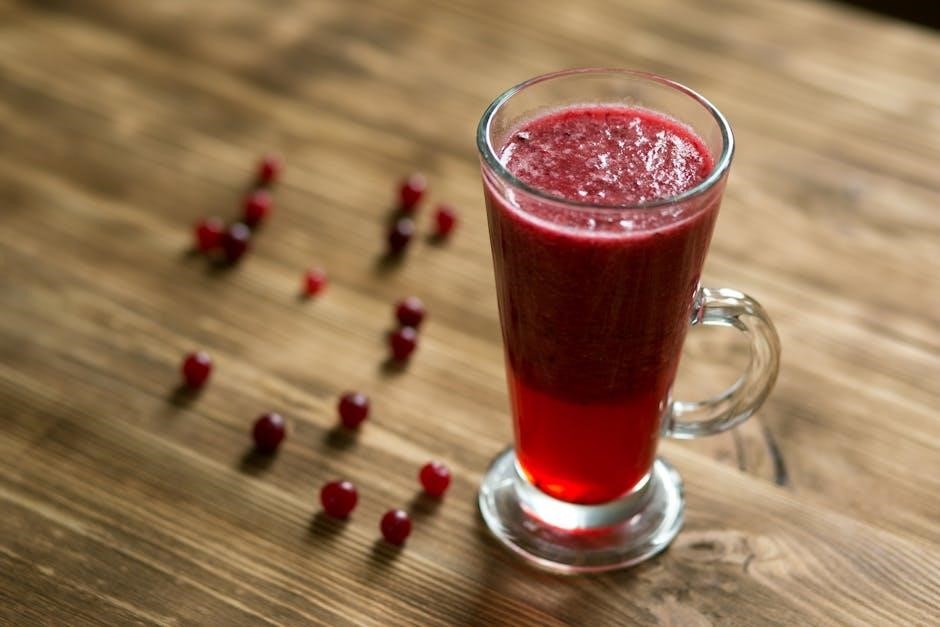
The anti-anxiety diet is a nutritional approach designed to reduce stress and anxiety by focusing on foods that promote mental well-being․ Incorporating magnesium-rich foods, omega-3 fatty acids, and fiber can help stabilize mood and gut health․ This diet emphasizes whole, nutrient-dense foods while avoiding processed and sugary items to support a balanced brain-gut connection․ By making informed dietary choices, individuals can empower their mental health and alleviate anxiety symptoms naturally․
Understanding the Link Between Nutrition and Mental Health
Nutrition plays a vital role in mental health, directly influencing brain function and mood regulation․ A diet rich in essential nutrients supports neurotransmitter production, such as serotonin, which calms the mind․ Conversely, deficiencies in magnesium, omega-3 fatty acids, and fiber can exacerbate anxiety․ The gut-brain axis highlights how dietary choices impact gut health, which in turn affects mental well-being․ A balanced diet reduces inflammation, stabilizes blood sugar, and promotes a healthy microbiome, all of which are crucial for managing anxiety effectively․ Thus, nutrition is a cornerstone of mental health care․
How Diet Impacts Anxiety Levels
Diet significantly influences anxiety levels by affecting neurotransmitter production, inflammation, and gut health․ Foods rich in magnesium, omega-3 fatty acids, and fiber help calm the nervous system, while processed and sugary foods can trigger anxiety․ The gut microbiome, shaped by dietary choices, produces neurochemicals that impact mood․ A diet high in antioxidants and vitamins supports brain health, reducing stress hormones like cortisol․ Thus, a well-balanced diet can either alleviate or exacerbate anxiety, making it a powerful tool in managing mental well-being․
Overview of the Anti-Anxiety Diet

The anti-anxiety diet focuses on reducing stress and anxiety through tailored nutrition․ It emphasizes whole, nutrient-dense foods like fruits, vegetables, lean proteins, and whole grains, while avoiding processed and sugary items․ Key components include magnesium-rich foods, omega-3 fatty acids, and probiotics to support brain health and gut balance․ By addressing inflammation, stabilizing blood sugar, and promoting neurotransmitter function, this diet aims to alleviate anxiety symptoms and foster mental well-being naturally; It’s a holistic approach to managing anxiety through dietary choices․

Key Components of the Anti-Anxiety Diet
The diet focuses on magnesium-rich foods, omega-3 fatty acids, fiber, and probiotics to support brain health and gut balance, reducing anxiety naturally through nutrition․
Magnesium-Rich Foods and Their Role in Reducing Anxiety
Magnesium-rich foods, such as leafy greens, nuts, and seeds, play a crucial role in reducing anxiety․ Magnesium helps regulate neurotransmitters, relax muscles, and promote better sleep, all of which contribute to lowered anxiety levels․ Studies show that magnesium deficiency is linked to increased anxiety symptoms, making these foods essential for mental well-being․ Incorporating magnesium-rich foods into your diet can provide a natural and effective way to alleviate anxiety and support overall mental health․
The Importance of Omega-3 Fatty Acids for Brain Health
Omega-3 fatty acids are essential for brain health, playing a key role in reducing anxiety and depression․ Found in fatty fish, flaxseeds, and walnuts, these fats support brain cell function and neurotransmitter production․ They reduce inflammation, which is linked to mental health disorders, and promote neural communication․ Regular consumption of omega-3-rich foods has been shown to improve mood stability and cognitive function, making them a vital component of an anti-anxiety diet for overall mental well-being․
Fiber-Rich Foods and Their Impact on Gut Health
Fiber-rich foods are crucial for maintaining a healthy gut microbiome, which directly influences mental well-being․ Foods like fruits, vegetables, and whole grains provide prebiotic fiber, nourishing beneficial gut bacteria․ A balanced gut microbiome reduces inflammation and promotes the production of neurotransmitters, such as serotonin, which helps alleviate anxiety․ Incorporating fiber-rich foods supports digestive health and strengthens the gut-brain axis, playing a vital role in managing anxiety and improving overall mental clarity and emotional stability․

Vitamins and Minerals for Anxiety Reduction
Essential vitamins and minerals play a crucial role in brain health, influencing mood and anxiety levels․ They support neurotransmitter function, stabilize emotions, and promote mental well-being․
B Vitamins and Their Role in Neurotransmitter Production
B vitamins are vital for synthesizing neurotransmitters like serotonin and dopamine, which regulate mood and emotions․ Deficiencies in B vitamins can lead to increased anxiety symptoms․ Foods rich in B vitamins, such as leafy greens, eggs, and whole grains, support brain health․ Ensuring adequate B vitamin intake helps maintain balanced neurotransmitter production, which is essential for emotional stability and reducing anxiety․ Incorporating these foods into your diet can promote mental well-being and resilience․
Vitamin D Deficiency and Its Connection to Anxiety
Vitamin D deficiency has been linked to increased anxiety symptoms, as it plays a role in regulating mood and emotional responses․ Low levels of vitamin D can disrupt neurotransmitter function, contributing to anxiety․ Foods rich in vitamin D, such as fatty fish, fortified dairy, and mushrooms, can help maintain optimal levels․ Sunlight exposure is also crucial for natural vitamin D production․ Addressing deficiency through diet and lifestyle may reduce anxiety and improve mental well-being․
Selenium and Mood Regulation
Selenium, an essential mineral, plays a key role in mood regulation and reducing anxiety․ It acts as an antioxidant, protecting brain cells from oxidative stress․ Foods rich in selenium, such as Brazil nuts, fish, and turkey, support neurotransmitter function and emotional balance․ Studies suggest that adequate selenium intake can improve mood and lower anxiety levels, making it a vital component of an anti-anxiety diet․ Ensuring sufficient selenium through diet can contribute to better mental health and overall well-being․

Probiotics and Gut-Brain Connection
Probiotics support gut health, which is closely linked to brain function and mental well-being․ A healthy gut microbiome aids in producing neurotransmitters that reduce anxiety and improve mood․
How Probiotic-Rich Foods Support Mental Well-being
Probiotic-rich foods, such as yogurt and kefir, promote a balanced gut microbiome, which is essential for mental health․ They reduce inflammation, enhance neurotransmitter production, and improve mood regulation․ A healthy gut-brain connection fosters emotional resilience, alleviating symptoms of anxiety and stress․ Incorporating these foods into your diet can lead to significant improvements in mental well-being by stabilizing the digestive system and supporting overall brain function․
Fermented Foods and Their Anti-Anxiety Effects
Fermented foods like sauerkraut, kimchi, and kefir are rich in probiotics, which support gut health and the gut-brain axis․ These foods reduce inflammation, enhance neurotransmitter production, and promote mental clarity․ Studies suggest they may lower anxiety by improving mood regulation and reducing stress markers․ Incorporating fermented foods into your diet can foster a healthier gut microbiome, leading to improved emotional well-being and reduced anxiety symptoms, making them a valuable addition to an anti-anxiety lifestyle․

Healthy Hydration and Anxiety Management
Staying hydrated is essential for brain function and mood balance․ Water and herbal teas, like chamomile, help maintain calmness and reduce anxiety symptoms by promoting mental clarity and relaxation․
The Role of Water in Maintaining Mental Balance
Water is crucial for brain function, comprising 80% of its composition․ Dehydration can lead to anxiety, mood swings, and cognitive impairments․ Even mild dehydration can cause fatigue, irritability, and difficulty concentrating, exacerbating anxiety symptoms․ Drinking enough water supports nutrient absorption, including omega-3 fatty acids and B vitamins, essential for neurotransmitter production․ Proper hydration also maintains gut health, reducing inflammation and promoting a balanced gut-brain axis․ Staying hydrated is foundational for mental clarity and emotional stability, helping to mitigate anxiety naturally․
Herbal Teas and Their Calming Properties
Herbal teas offer natural calming effects, making them a valuable addition to an anti-anxiety diet․ Chamomile tea, known for its soothing properties, helps reduce stress and promote relaxation․ Lavender tea calms the nervous system, while passionflower tea has been shown to ease anxiety symptoms․ These teas work by influencing neurotransmitters and promoting a sense of calm without the side effects of medications․ Incorporating herbal teas into your routine can provide a gentle yet effective way to support mental well-being and reduce anxiety naturally․

The Mediterranean Diet and Anxiety Reduction
The Mediterranean diet, rich in fruits, vegetables, and omega-3s, has been linked to lower anxiety levels due to its anti-inflammatory properties and nutrient-dense profile․
Key Features of the Mediterranean Diet
The Mediterranean diet emphasizes whole, unprocessed foods like fruits, vegetables, whole grains, and healthy fats, such as those from olive oil․ It includes moderate amounts of lean proteins, like fatty fish rich in omega-3s, and low amounts of red meat․ Fermented foods, herbs, and spices are also central, providing anti-inflammatory and antioxidant benefits․ This dietary pattern is known for its balanced and sustainable approach, promoting overall health and mental well-being, including reduced anxiety symptoms․
Scientific Studies Supporting Its Anti-Anxiety Effects
Research consistently highlights the Mediterranean diet’s role in reducing anxiety․ A 2019 study found that individuals following this diet experienced fewer anxiety symptoms․ The diet’s emphasis on omega-3 fatty acids, antioxidants, and whole grains helps lower inflammation, a known contributor to anxiety․ A 2024 analysis revealed that adherence to the Mediterranean diet correlated with reduced anxiety levels, further supporting its anti-anxiety benefits․ These findings underscore the diet’s potential as a natural strategy for managing anxiety and improving mental health․

Foods to Avoid in an Anti-Anxiety Diet
Foods to avoid include processed items, refined sugars, and excessive caffeine or alcohol․ These can trigger anxiety by causing inflammation, energy crashes, or disrupting neurotransmitter balance․
Processed Foods and Their Impact on Mental Health
Processed foods, often high in unhealthy fats, sodium, and artificial additives, can negatively impact mental health․ They promote inflammation, which is linked to increased anxiety and depression․ Regular consumption disrupts gut microbiota balance, affecting neurotransmitter production and mood regulation․ These foods contribute to energy fluctuations, leaving individuals feeling fatigued and emotionally unstable․ Eliminating or reducing processed foods is crucial for maintaining mental well-being and reducing anxiety symptoms effectively․
Refined Sugars and Anxiety Triggers
Refined sugars cause rapid blood sugar spikes and crashes, leading to energy fluctuations and mood swings․ This instability can trigger anxiety symptoms like irritability and restlessness․ High sugar intake promotes inflammation and oxidative stress, further exacerbating anxiety․ Additionally, sugar cravings and withdrawal can create a cycle of emotional distress․ Reducing refined sugar intake helps stabilize blood sugar levels, supporting a calmer and more balanced mental state, which is essential for managing anxiety effectively and improving overall mental well-being through dietary adjustments․
Caffeine, Alcohol, and Their Effects on Anxiety
Caffeine and alcohol can significantly impact anxiety levels․ Caffeine, found in coffee and energy drinks, can increase heart rate and mimic anxiety symptoms, worsening feelings of unease․ Alcohol, while initially calming, disrupts serotonin and GABA levels, leading to heightened anxiety․ Both substances can interfere with sleep quality, further exacerbating anxiety․ Reducing or eliminating these stimulants can help stabilize mood and reduce anxiety triggers, promoting a calmer mental state and supporting overall mental health through dietary adjustments․

Practical Tips for Implementing the Anti-Anxiety Diet
Plan balanced meals, shop for whole foods, and introduce changes gradually to avoid overwhelm․ Consulting a nutritionist or psychiatrist can tailor the diet to individual needs effectively․
Meal Planning and Grocery Shopping Strategies
Plan weekly meals to avoid impulsive, unhealthy choices․ Create a grocery list focusing on anti-anxiety foods like leafy greens, fatty fish, and fermented items․ Shop for whole foods, avoiding processed sugars and caffeine․ Incorporate magnesium-rich snacks and omega-3 sources to stabilize mood․ Gradual dietary changes can ease the transition․ Consider consulting a professional for personalized plans․ Stay hydrated with herbal teas and limit alcohol․ Prioritize fresh, seasonal produce for optimal nutrition and mental health benefits․
Gradual Changes for Sustainable Results
Adopting an anti-anxiety diet requires patience and gradual adjustments for lasting benefits․ Start by incorporating one or two nutrient-dense foods weekly, such as leafy greens or berries, to avoid overwhelming changes․ Replace sugary snacks with magnesium-rich options like nuts or seeds․ Introduce omega-3 sources like fatty fish gradually․ Stay hydrated with water and herbal teas․ Avoid drastic overhauls, as they can lead to frustration․ Instead, focus on small, consistent shifts to foster a healthier relationship with food and mental well-being over time․
The Importance of Consulting a Professional

Consulting a professional, such as a nutritional psychiatrist or dietitian, is crucial for tailoring the anti-anxiety diet to individual needs․ They provide personalized advice, ensuring the diet aligns with health goals and addresses underlying conditions․ Experts can help identify potential nutrient deficiencies and recommend supplements if necessary․ Their guidance ensures a balanced and effective approach, avoiding unnecessary restrictions․ Professional insights also help manage expectations and track progress, making the journey sustainable and impactful for mental well-being․
The anti-anxiety diet offers a powerful approach to enhancing mental well-being by focusing on nutrient-rich foods that reduce anxiety and promote balance․ A holistic, balanced diet, combined with professional guidance, can significantly improve mental health outcomes, empowering individuals to manage stress and anxiety effectively․
Summarizing the Benefits of the Anti-Anxiety Diet
The anti-anxiety diet provides a holistic approach to mental well-being by reducing anxiety symptoms through nutrient-rich foods․ It emphasizes magnesium, omega-3s, and fiber, which stabilize mood and gut health․ By avoiding processed foods and sugars, this diet supports brain function and emotional balance․ Studies show that diets high in fruits, vegetables, and whole grains correlate with lower anxiety levels․ Incorporating probiotics and staying hydrated further enhance its benefits, offering a sustainable path to improved mental health and overall well-being․
Encouragement for Adopting a Holistic Approach to Mental Health
Adopting a holistic approach to mental health combines nutrition, physical activity, and self-care to foster resilience against anxiety․ By integrating the anti-anxiety diet with mindfulness practices, therapy, and stress management, individuals can create a comprehensive strategy for well-being․ This approach empowers individuals to take control of their mental health, recognizing the interconnectedness of body and mind․ Small, consistent changes can lead to profound, lasting improvements in emotional balance and overall life quality․




